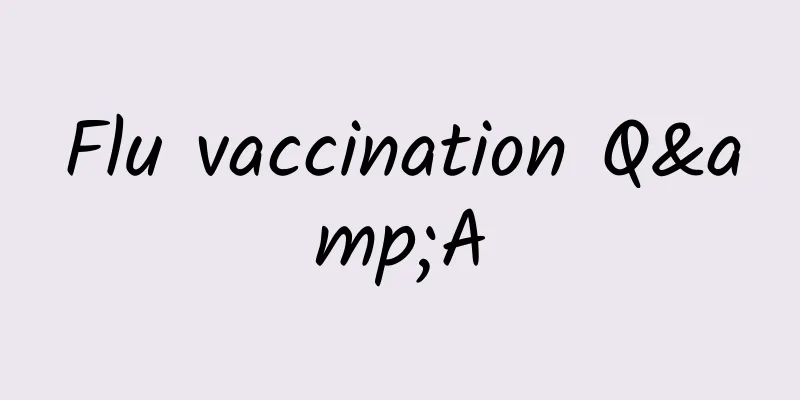Flu vaccination Q&A

|
Q: When is the best time to get the flu vaccine? A: Influenza can occur all year round, but it is more common in the cold winter and spring. Influenza usually occurs in winter and spring, and the protection time of influenza vaccine is usually about half a year. Therefore, getting the influenza vaccine from September to November not only catches up with the peak period, but also has a preventive effect until March to April of the following year, which can effectively avoid the peak season of influenza. Q: Why do we need to get the flu vaccine every year? A: Influenza viruses are prone to mutation and are highly contagious. People of all ages are susceptible to influenza. One of the best ways to control its spread is through vaccination. Influenza vaccines are produced based on the predicted virus strains that will be prevalent in the coming year, so influenza vaccines should be administered at least once a year. Q: Which flu vaccine is best? A: All vaccines used for influenza vaccination in my country are inactivated vaccines, which are divided into three categories: subunit vaccine, split vaccine and whole virus vaccine. Among them, split vaccine has become the main vaccine currently used due to its excellent immunogenicity and safety. The vaccine contains 3 virus strains, 2 type A and 1 type B. The active ingredients of these virus strains have been "killed" during the vaccine production process, so you will not be infected with influenza after getting the flu vaccine. Q: Which groups of people are suitable for vaccination? Answer: The key recommended groups are infants and young children aged 6 to 35 months, people over 60 years old, patients with chronic diseases and the frail and sick, medical institution practitioners and service industry practitioners, etc. Q: Which groups of people should not be vaccinated? A: The flu vaccine is cultured in chicken embryos, and the finished flu vaccine also contains a certain amount of egg protein, so people who are allergic to eggs are strictly prohibited from getting the vaccine. In addition, for some symptoms that may be related to allergies, such as headaches, oral ulcers, diarrhea, recurrent urticaria, joint pain, etc., you can go to the allergy department (allergy) to test serum specific Ig E to determine whether it is an egg allergy. In addition to eggs, vaccination is not recommended in the following situations. 1. People with active hepatitis, active pulmonary tuberculosis, kidney disease, or severe heart disease. 2. Cancer patients using immunosuppressants. 3. Patients with neurological diseases, such as Guillain-Barré syndrome, hysteria, epilepsy, and cerebral hypoplasia. 4. People with allergic constitution, such as asthma, urticaria, etc. 5. People with severe malnutrition, severe rickets, or congenital immunodeficiency. 6. People who are allergic to other ingredients in the vaccine (such as benzene, formalin and neomycin). 7. Vaccination should be postponed during pregnancy, lactation and menstruation. 8. People with febrile or infectious diseases should postpone vaccination. 9. For those who suffer from chronic allergic diseases and undergo desensitization treatment, desensitization treatment should be suspended one week before and two weeks after vaccination. When desensitization treatment is continued, the dose should be half of the last desensitization dose. Q: What are the benefits of vaccination? A: The principle of the vaccine is to artificially cultivate a false antigen based on the antigenic characteristics of the virus. Vaccination is like firing blank shells. The human immune system will build a special defense force. When the real shells come, the special defense force will keep the enemy out of the city gate and protect the human body from invasion. Flu vaccination is effective in preventing colds and has proven efficacy. According to statistics, after children and adults under 65 years of age are vaccinated, the incidence of flu is reduced by 70% to 90%, and after vaccination for elderly people over 65 years of age, the incidence of flu is reduced by 50% to 60%. The risk of hospitalization due to pneumonia or post-vaccination flu is reduced by 27%, and the risk of flu-related death is reduced by 48%. In addition to preventing flu, flu vaccines also have a certain preventive effect on some other diseases, such as reducing the incidence of various respiratory infections by 32% and the incidence of heart failure by 27%. Q: What are the adverse reactions to vaccination? A: The incidence of adverse reactions after vaccination is generally low, of which 95% are mild reactions. Local reactions are manifested as pain, redness and swelling, and systemic reactions are generally low-grade fever, headache, muscle aches, joint discomfort, etc. Itching or urticaria are rare. Generally, they can be relieved by themselves, or chlorpheniramine and other drugs can be taken orally for symptoms. If there are drowsiness, dizziness and other discomforts, those who are engaged in high-altitude work, driving, etc. should be vigilant. Young people usually have more severe reactions than older people, but serious adverse reactions are rare. If you experience a burning sensation above and below the tongue, in the throat, especially in the palms of your hands and soles of your feet, you should be alert and seek medical attention immediately. Q: What should I pay attention to when getting vaccinated? A: Try to avoid fasting before vaccination. Keep the vaccination site clean after vaccination, and pay attention to ventilation and rest. Medical staff who perform vaccinations should strictly fulfill their obligation to inform before vaccination, conduct contraindication screening, and stay for observation for 30 minutes after vaccination to ensure that the patient has no discomfort before leaving. Q: Why might vaccinations be ineffective? A: There are two reasons why vaccination is ineffective. One is the difference in physiological immune status between individuals, and the other is whether the specific antigen of the influenza polyvalent vaccine injected matches the current circulating virus strain. If it does not match, even if you get influenza again, the symptoms will be milder than those who have not been vaccinated. |
>>: Edelman: 2020 Trust Barometer
Recommend
Does vaginal tightening gel really work?
The problem of vaginal relaxation is very common ...
Why do sandstorms occur? What should we do if we encounter a sandstorm?
Sandstorm is a natural phenomenon with great dest...
What can be found in gynecological examination of leucorrhea
During a gynecological examination, B-ultrasound ...
How to reduce swelling on one side of the vulva
Some female friends will be very confused when th...
When can a baby be taken outside?
We all know that babies are weak and have low imm...
How to relieve eye fatigue from watching videos, watching TV series, and playing games every day?
《Cotton Swab Medical Science Popularization》 Depa...
Hypertension is "most afraid" of these 7 dangerous moments, the risk of sudden death increases sharply!
May 17th is World Hypertension Day. This year'...
Reasons for spotting during the 36th week of pregnancy
Pregnancy is something that makes many people hap...
I went back to work the next day after the successful abortion.
Medical abortion is a commonly used method of med...
What are the methods of cooking dried hawthorn? How to cook hawthorn juice cola chicken wings?
Hawthorn can stimulate appetite and help digestio...
What does a comprehensive gynecological examination include?
Women must actively cooperate when undergoing phy...
Can I eat shrimp during menstruation?
Menstruation is a special physiological phenomeno...
Picture of lumps under the armpit after pregnancy
During pregnancy, various growth hormone indexes ...
What's the best medicine for broken skin?
The female vagina is one of the weakest parts of ...
Can I eat barbecue during my period?
We all know that for female friends, it is very n...









